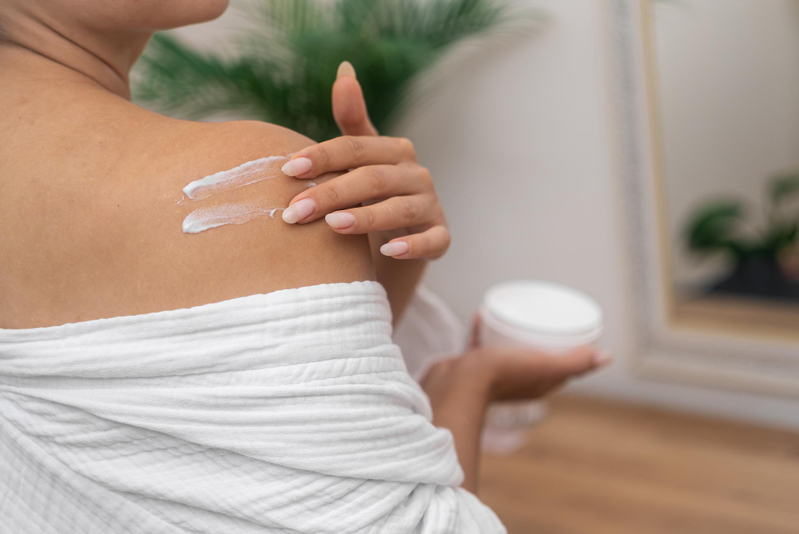Psoriasis sufferers in Canada may find the summer months particularly challenging. Air conditioning and chlorine can dry out the skin and cause flare-ups of seasonal psoriasis, but humidity and sunshine can help relieve symptoms. Thankfully, there are strategies to prevent psoriasis in the summer, so you can enjoy yourself to the fullest.
Understanding Psoriasis in the Summer
Warm weather often brings relief from psoriasis. Sunlight reduces skin patches, while higher humidity relieves dry skin. Sunlight is the primary reason why psoriasis symptoms improve during the summer. There may also be an association between vitamin D levels and psoriasis.
Furthermore, swimming, particularly in salt water, removes dead skin and improves the appearance of psoriasis. People can still experience flare-ups during the summer months. It is recommended that people continue with treatment during the summer, even if their symptoms improve, as this can aid in symptom management for the rest of the year.
Does Psoriasis Go Away in the Summer?
Possibly! The sun is most likely one of the reasons why psoriasis improves during the summer months in Canada. The majority of people with this condition appear to benefit from ultraviolet light. This is why doctors occasionally prescribe light therapy. You should still use a broad-spectrum sunscreen with a minimum SPF of 30.
Challenges of Psoriasis in the Summer
Heat and sweat can aggravate your psoriasis, particularly on the face and scalp. Air conditioning can help you avoid sweating, but it also dries out your skin. If you spend a lot of time in air conditioning, moisturize with a thick cream or ointment once or twice a day.

Summer activities, like lounging by the pool or hitting the beach, can make psoriasis worse. Don’t sunbathe for more than 15 minutes; getting burned can trigger flare-ups. Saltwater and chlorinated pools can dry out the skin. Rinse thoroughly after swimming; use a gentle moisturizer. Insect bites and DEET-based repellents can also aggravate psoriasis. Be cautious and protect your skin.
How to deal with Psoriasis flare-ups in the summer?
There are several strategies for managing psoriasis in the summer. To avoid flare-ups, stay hydrated, wear sunscreen, and limit your time in the sun. Read on to learn more about these strategies for making the most of your summer activities:
- Avoid wearing synthetic fabrics: Instead, opt for breathable, natural fabrics like cotton to prevent irritation.
- Wear cotton and layer your clothing: This will help you stay cool and comfortable while also protecting your skin from potential triggers like sweat and friction.
- Showers and baths should be lukewarm, not too hot: Hot water can aggravate psoriasis, so it’s important to keep your showers and baths at a lukewarm temperature. After bathing, make sure to moisturize your skin.
- Wear sunscreen and insect repellent: Wearing a cotton maxi dress with a lightweight cardigan and wide-brimmed hat can help protect your skin from the sun while keeping you cool.
- Use fragrance-free cosmetics: Look for products labeled “hypoallergenic” or “gentle” to minimize the risk of skin reactions.
- After a swim, it’s crucial to rinse off immediately. This action helps to wash away chlorine and other chemicals that might aggravate psoriasis. When drying off, avoid rubbing your skin; instead, pat it dry gently with a towel to prevent further irritation.
- Hydrating your skin is essential, so using high-quality moisturizers can keep it well-nourished and healthy. Look for products with ingredients such as hyaluronic acid or shea butter; these help lock in moisture and soothe dry, irritated skin. Keep your skin happy.
- Avoid foods that may cause inflammation (or limit your consumption of them). These include sugar, highly processed foods, and red meat.

Treatment Options for Psoriasis in the Summer
Additional treatment is necessary for flare-ups, some of which may need a doctor’s or dermatologist prescription. For mild-to-moderate flare-ups, topical skin treatments are typically the first line of treatment. Retinoids, corticosteroids, and calcineurin inhibitors are a few examples of these. Additionally, moisturizing products containing coal tar or salicylic acid are used.
In the event that topical therapies fail, oral drugs such as immunosuppressants or antibiotics might be necessary. To effectively manage flare-ups, it is crucial to seek advice from a healthcare professional regarding the best course of action.
Other drugs, such as immunosuppressants or biologics, may be required for more severe flare-ups. Additional choices include phototherapy or other UV-based skin-repair procedures. Online psoriasis treatment services like RemoteDerm can be helpful if you require prompt access to a medical practitioner. They offer greater convenience in this regard.
Psoriasis Diet Guide: What is Safe?
A well-rounded diet of whole foods is the best approach to minimizing inflammation throughout the body; it can help with psoriasis flare-ups or make the symptoms less severe. Healthcare professionals advise the following psoriasis diet guide for people with psoriasis:
- Lean chicken, fish, and vegetable protein sources, such as tofu and tempeh, are rich in omega-3 fatty acids. Omega-3 fatty acids are the most beneficial because they lessen inflammation.
- Fruits and vegetables are also important; they are high in antioxidants and vitamins, which help reduce inflammation and support overall health.
- Legumes (beans and lentils) are high in protein and fiber, both of which can aid in weight loss and inflammation reduction.
- Nuts and seeds are, without a doubt, high in monounsaturated fats and possess anti-inflammatory qualities, and this is the reason why they make a perfect snack for people with psoriasis.
- Olive oil has been an essential part of the Mediterranean diet due to its monounsaturated fats, which are infused with anti-inflammatory benefits.
- Including small amounts of low-fat dairy, such as Greek yogurt or low-fat milk, in your diet can help improve your bone health by providing calcium and vitamin D while at the same time reducing inflammation.
- Whole grains, such as quinoa, brown rice, and oats, are filled with fiber and can help regulate blood sugar levels, resulting in a lower risk of inflammation-related ailments.
Final Thoughts
Psoriasis management in the summer can be quite a daunting task in Canada, but you can still enjoy the season with a few smart strategies. Natural relief usually comes from sunlight and humidity while a proper skincare routine and smart diet enhance skin health. Drinking a lot of water, putting on breathable clothes, and using harmless perfume-free products are good ways to prevent flare-ups. In addition, consulting professional and online treatment options for psoriasis in the summer may be of great help to stop the symptoms. Attend a summer party without a care in the world with psoriasis management assuredly in your hands.
FAQs
1. Does swimming play an important role in the treatment of psoriasis?
Absolutely, swimming in seawater can aid in the shedding of dead skin cells thus lessening the inflammation, but don’t forget to moisturize so as not to get your skin dry.
2. Are there any specific sunscreens recommended for psoriasis?
Breathe in products that have a hypoallergenic base and no scent or alcohol. Sunscreens containing zinc oxide or titanium dioxide are often sold as mineral-based ones.
3. How does air conditioning affect psoriasis in the summer?
Through air conditioning, the skin gets dried, thus the possibility of psoriasis getting worse rises. The use of a humidifier and moisturizing regularly could lead to this.
4. Can stress levels increase psoriasis flare-ups during summer vacations?
Of course, stress is the big one for psoriasis. Stress is the common factor, so you should follow relaxation methods, get enough rest, and set realistic goals to minimize it.
